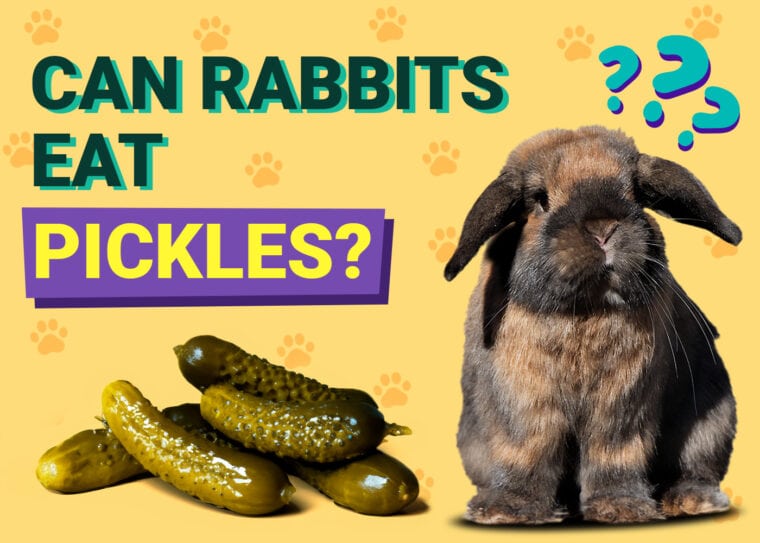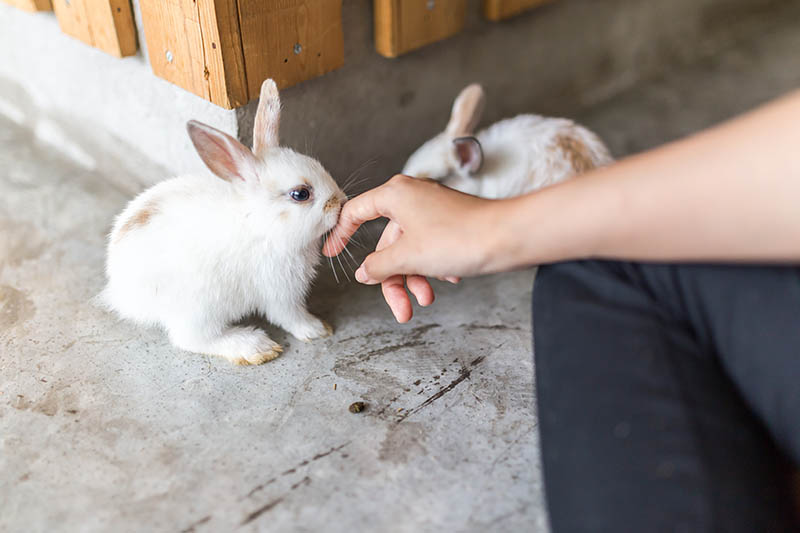
Rabbits are incredibly sensitive creatures that respond to oddities in their diet with not-so-great reactions. Our rabbits are herbivores and cucumbers are vegetables, so you may think that they can eat pickles—but is this true?
Even though pickles are most certainly cucumbers in disguise, they aren’t the best snacks for rabbits—and you should certainly avoid giving this item to your bunnies for a treat. We’re going to explain why you shouldn’t feed your rabbits pickles in general, and when they are toxic to our furry friends.
Pickles Are Non-Toxic to Rabbits
We’ll be clear—dill pickles are usually not toxic to rabbits. But salt is one of the biggest problems with pickles, and your rabbit really receives no nutritional reward from eating them.
However, many pickles can have potentially toxic ingredients in the jar. If your rabbit nibbled on a small piece of pickle, it might not cause any detrimental effects, but a large amount is asking for trouble.

Pickle Nutrition Facts
| Amount Per: | 1 Spear |
| Calories: | 4 |
| Carbohydrates: | .08 g |
| Fiber: | .3 g |
| Sodium: | 283 g |
| Protein: | .2 g |
| Sugar: | .4 g |
Pickles Can Be Toxic, Depending on the Ingredients
You might find all sorts of nifty pairings in fancy jars of pickles. But here are some of the most common ingredients.
Cucumbers
Cucumbers are full of antioxidants, vitamins, and minerals. Plus, they provide ultimate hydration. On their own, cucumbers are a fabulous snack for rabbits.
Dill
Rabbits can eat dill without issue, and it’s actually quite good for them. Dill is full of vitamin C, magnesium, and vitamin A.
Vinegar
All canned pickles contain vinegar—it’s an essential element of the canning process.
Salt
Since rabbits can be so sensitive, it isn’t a good idea to introduce anything to their diets that might upset them. Even though pickles are non-toxic, they contain a high amount of sodium, which could react poorly in your rabbit’s system.
Garlic
Not all pickle brines contain garlic, but some of them do. It might be no surprise to you that garlic is toxic to rabbits. After all, it is similarly problematic to all sorts of animals, including dogs, cats, and horses. In rabbits, garlic causes immunosuppressive effects that can have serious implications.

More About Salt
Rabbits do not need additional salt outside of their diets of standard rabbit feed and Timothy hay. Wild rabbits get salt in nature from rock surfaces. While salt is essential for bodily functions of the nerves, muscles, and fluid, the amount needed is limited.
According to the National Research Council, only .5% of a rabbit’s everyday diet will consist of salts. Most of the time, rabbits instinctively know when they’ve had enough salt and will stop consuming anything with high amounts of sodium.
That is not the truth for every rabbit, however. So while most rabbits will know when to stop eating salty items, you must ration others. And we shouldn’t wait to find out which your bunny will choose.
What to Do If Your Rabbit Eats Pickles
If your rabbit eats a pickle, it could cause some annoying symptoms for them, like an upset stomach. If the recipe contains garlic, it’s best to get them to the vet right away for an evaluation. The sooner you get them in, the better.
Your vet will run the necessary tests to see if there is any issue. Since rabbits can be very sensitive, any significant body changes can cause severe effects. It’s always best to be on the safe side.

Can Rabbits Eat Cucumbers?
If you feed your dog any cucumber, ensure it’s a fresh veggie—not cooked, seasoned, or canned. Since cucumbers offer little nutrients for your rabbit, they should only occasionally eat a few nibbles.
A Solid Rabbit Diet Is Important
Ultimately, your rabbit should have a combination of commercial rabbit food, Timothy hay, and fresh fruits, vegetables, and grains.
Control the number of pellets your rabbit has. They should have a limited amount every day based on their body weight. While pellets should be rationed, they should have a fresh, unlimited amount of grass hay to aid in smooth digestion.
So, the best thing to do is steer completely clear of anything processed or altered in any way.
Final Thoughts
When it comes to feeding your rabbit snacks, you should steer clear of the pickles. While they might be crunchy and delicious to humans, rabbits need a different variety of veggies.
Rabbits can be very sensitive regarding their diet. So the more natural, the better. Rely on rabbit-safe snacks instead – no pickles for Peter Rabbit, please.
Featured Image Credit: Ron Lach, Pexels









